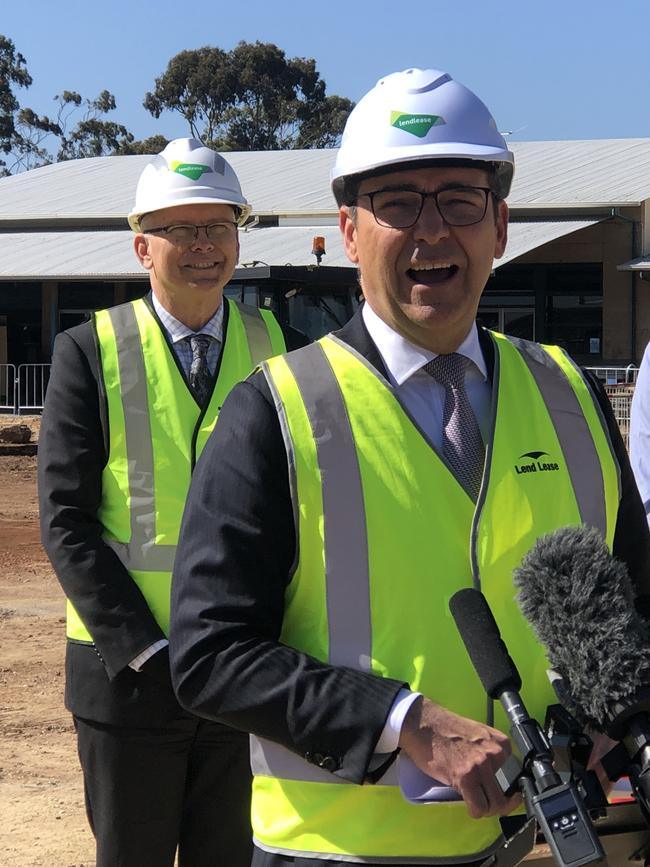Daniel Wills: A historic national recession puts pressure back on Premier Steven Marshall for stimulus to beat job epidemic
With the nation in its first recession in decades and states being told to find their own way out, Steven Marshall’s health record may be forgotten come election time, writes Daniel Wills.
Opinion
Don't miss out on the headlines from Opinion. Followed categories will be added to My News.
This was yet another historic week for the country, in a year full of them, with confirmation of our first recession in nearly three decades.
It’s a moment that forces everyone to look back with nostalgia, and forward with trepidation.
Coronavirus has had its dead hand on Australia for six months now, resulting in two straight financial quarters where the economy got smaller and a technical recession.
But that dry academic definition doesn’t go anywhere near colouring in the devastating human picture.
In SA, despite a positive couple of months in which 20,000 jobs were added back as restrictions eased, there are 19,800 more people in SA without jobs than in January.
That’s 19,800 people who’ve lost a pay cheque and the purpose of work.
It’s families who wonder when their world will ever go back to normal. It’s often the lowest paid and least skilled workers hit hardest, who have less to fall back on.
Despite encouraging headlines about the progress of vaccine development, there’s no certainty around when a silver bullet will arrive, nor any guarantee it ever comes. Many commentators are now starting to argue that we are must accept a continuing and possibly increased presence of death to avoid the wider devastation of a depression.
At once, it causes you to reflect that the good old days actually were just that. The reforms of Hawke and Keating, as well as the steady stewardship of Howard, delivered the country a 28-year endless summer.
But good as they were, they are indeed old. With that grim reality setting like concrete, governments are being called on to dig deep again.

Both Prime Minister Scott Morrison and Premier Steven Marshall have improved their popular standings through the early, mostly health-focused phase of COVID.
And they made all the right sounds on economic action.
Mr Morrison smashed open the piggy bank and threw almost countless billions of dollars into the economy just to keep it afloat. With Australia’s recession so far significantly shallower than other parts of the world, it’s partly paid off.
Mr Marshall too was fast out of the blocks announcing $1bn in stimulus, a move that seemed geared at underwriting confidence while he worked out exactly where the money would go and what had to be done next to further build jobs.
Both men successfully bought themselves time. Now that is expiring as an increasingly weary public looks for a new exit plan and wonders what happens when the money eventually just runs out.
To date, much of the stimulus response has been nationwide and led by the Federal Government. Suburbs, towns, cities and states have risen and fallen together. Those with the best health efforts have been able to leverage it into more jobs.
But the Reserve Bank is sending strong signals that it, and the federal budget are tapped out.
It says states are going to have to do more. That has the effect of shunting a lot of the political pressure back to the local level and putting state leaders into a competition to show who has the right plan to get out of this the strongest.
Mr Marshall has flagged a second wave of stimulus, to feature in the November budget but begin immediately. He describes it as an effectively constant program of “rapid-fire projects”, aimed at dealing with economic need as soon as it arises.
It’s like jobs whack-a-mole.
MORE NEWS
Secret truth behind Aussie recession
400,000 more jobs may go by Christmas
$88m skills boost for SA school leavers, unemployed
He cites pandemic leave support and a new $88m skills training program as examples of what’s needed. He shows a surprising lack of concern about skyrocketing debt.
There’s no reason to doubt he genuinely thinks it the right policy approach. Its follows RBA advice.
But there’s also an unmissable political component in the play. When the next election comes in 2022, there’s every chance that people’s panic about the health effects of COVID-19 will give way to a greater focus on jobs. That’s especially likely if the health results continue to be excellent, and taken for granted.
Mr Marshall has been criticised for failing to be as aggressive as other states on stimulus spending, and needs to make up lost ground.
Labor is taking out rhetorical insurance on the economic question, as Opposition treasury spokesman Stephen Mullighan warns: “No one will forgive Steven Marshall and Treasurer Rob Lucas for penny-pinching their way to a recovery. How much they spend will determine how long and deep the recession is in SA.”
That seems designed to let Labor claim at election time, regardless of whatever Mr Marshall actually does, that he should and could have done even more.
And with states now expected to make more independent decisions, their futures are very much in their own hands.
